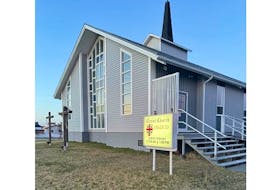
Douglas and Virtue Parrell have been married for nearly six decades, but are now living apart — he is in a long-term care home on the province’s west coast and she is in a St. John’s facility. Family have been trying to get him placed with her.
“We’re almost parted 12 months. I don’t understand what is going on. I talk to her pretty well every night. She says, ‘Come in, come in, come in,’” he said in a telephone interview.
“I’d like to get in with my wife. We’d been living so long together. Up to our age — she going 89, I going 87 — I don’t see why they come to part us up when in that age, you need the company.”
He is in a Level I placement in Flower’s Cove on the Northern Peninsula, and Virtue Parrell was sent to St. John’s for a reassessment last March and placed in Glenbrook Lodge in mid-August.
By “company,” Douglas Parrell is talking about well-being — family say his wife has dementia and she has been noticeably deteriorating since being separated from her spouse. They say professionals handling her case have written supportive letters about reuniting the couple.
The couple, from Sandy Cove, had been in the nearby Flower’s Cove facility for about four years together, when, family say, Virtue needed to be reassessed and was sent into the Waterford, where long-term care assessments are carried out. The issue is not her being placed in St. John’s — she has family here — but with her husband not being placed in Glenbrook with her.
“We go to visit her every night and we see a difference in her,” said daughter-in-law Virginia Parrell, who has been lobbying on the couple’s behalf since last year. She and her husband and family live in St. John’s.
Douglas and Virtue’s son, Roland, who lives in Saskatchewan, said the Eastern Health officials dealing with the case seem cold.
“It just amazes me that Eastern Health placement services in particular could have so much information since October on how my mother’s separation from her husband has had a negative impact on her,” Roland said.
Virginia Parrell said an offer was made by Eastern Health to put Douglas in Level I care somewhere in the metro area, but because of chronic obstructive pulmonary disease (COPD), he wouldn’t physically be able to make daily visits to see his wife at Glenbrook, nor would Virtue understand him coming during the day and then going away again. He has come in for visits, including at Christmas, and found getting back and forth to see his wife taxing.
“I think moving him to a new surrounding would be tough on him,” said Virginia Parrell.
“It’s a job to get my boots on with my knees and that,” Douglas explained.
The family also fears if he got placed somewhere in St. John’s, there would be zero incentive for the authorities to unite the couple in the same facility.
Virginia Parrell said the family has had no sense from Eastern Health when the couple might be put together, and suspects her father-in-law needs a higher level of care.
She is questioning some of the priority given other transfers and placements, and beds being left open, suggesting spouses aren’t getting enough consideration, especially when keeping elderly couples apart affects their health and well-being.
NDP health critic Lorraine Michael is questioning Eastern Health’s spousal placement policy, suggesting there is one in theory that would unite spouses in special circumstances, but in practice it’s non-existent. She recounted she said as much to an Eastern Health long-term care official.
“The bottom line is, you might have a policy, but you don’t have a policy,” Michael said.
She said she has been dealing with Eastern Health about the couple’s case and a dozen days ago she delivered a letter outlining the Parrells’ situation to Health Minister Dr. John Haggie, asking for two things in particular — the department’s help to reunite the couple and for Haggie to review Eastern Health’s policy on spousal placements.
As for Eastern Health’s offer of a Level I placement, Michael said that’s a red herring — the couple, because of their medical issues and age, need to be together.
“The family really sees her going down,” Michael said.
Michael said as she understands it, after emergencies and finding beds for elderly people who are in hospital waiting for nursing home care, the placements then go by a waitlist. She said she’s been told Douglas is No. 2 on a spousal placement waitlist. But she said it can take a couple of years.
“Eastern Health is saying, ‘He’s there (on the list), he’s going to have to wait, someday he will get in,’” said Michael, acknowledging that for people of advanced age, a year or two is a monumental time frame.
“That can be never happening. It’s a hard thing to say, but it’s true.”
As of Telegram deadline Thursday, Michael had not heard back from Haggie, other than a brief receipt-of-letter acknowledgement from staff.
Provincial long-term care operational standards from 2005 suggest that when a spouse doesn’t meet the same level of care, placement can be considered “where it has been determined that separation is detrimental to a spouse.”
Eastern Health’s said its long-term care placement policies are based on greatest need for care, but it does allow for spousal admissions in exceptional circumstances. “We recognize that some couples wish to reside together in one long-term care facility and that being separated due to care needs can create an emotional hardship for the couples,” Eastern Health said in an email response, acknowledging there is often a wait time due to the demand for urgent admissions to long-term care. Most times, the person with the highest care needs is admitted first, at which time Eastern Health works to accommodate the other person as soon as possible, the health authority said.
“Eastern Health makes every effort to accommodate couples who wish to reside together in one long-term care facility. However, if a couple cannot be admitted to the long-term care facility of their choice, Eastern Health will recommend alternative facilities that would have the available capacity,” the statement said.
The Department of Health has stated it will make a statement about the situation Friday.








